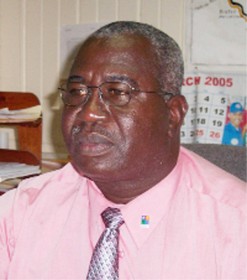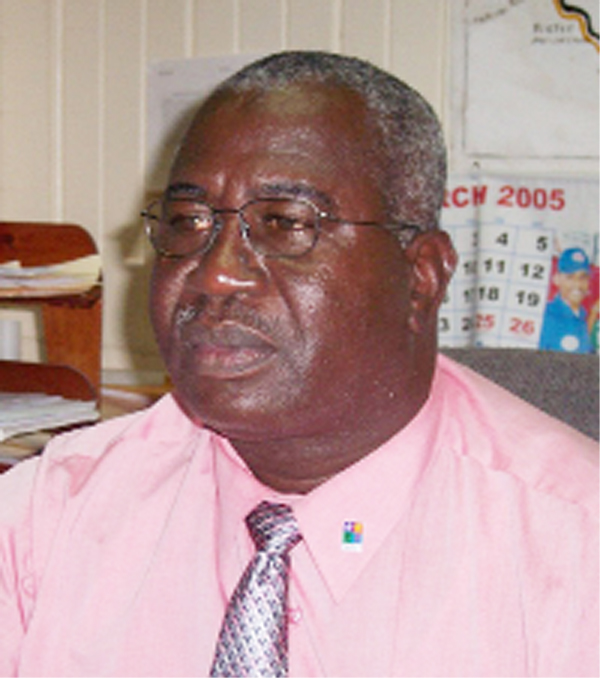-successor entity still a mystery
By Cathy Richards
Stakeholders in Linden are concerned that there are still no clear indications about the make-up of the successor programme in-tended to manage the soon-to-be-defunct LEAP.

The seven-year European Union (EU) Linden Eco-nomic Advancement Pro-gramme (LEAP) ends today. Over a year ago the advisory group comprising the Mayor and Town Council (M&TC), the Regional Democratic Council, Linden Chamber of Commerce, Industry and Development (LCCID) and LEAP’s International Pro-gramme Manager had started discussions about the transition of LEAP and what, if any, support the transition programme will lend to incomplete programmes.
The advisory committee had agreed that there was need for a successor programme or entity to take care of a number of the components of LEAP. Con-sideration was being given mainly to the micro-lending entity, the Linden Econo- mic Advancement Fund (LEAF), the business advisory service and the agriculture component of the programme. A number of small businesses benefited from LEAP and the lending facility LEAF and are still in need of its services or they are likely to fail.
Stabroek News understands that these and a number of other concerns were aired at a series of meetings hosted last year. Stakeholders had concretized a formal proposal of the advisory group’s initiative for a successor company which was taken to the government and the EU. The proposal examined several models including private sector or private/public sector management among others.
In an interview, Regional Chairman Mortimer Mingo said, “Coming out of that company would have derived a memorandum of association and it determined the board of directors, the composition of the board. We were informed I think in May of this year, that …the government of Guyana through the Ministry of Finance has accepted the proposal for a formation of a new successor company which would take up some of the responsibilities which was being done through the LEAP.” Mingo said subsequent to that development, the advisory group had made a public statement to residents of Linden about the formation of the new entity to succeed LEAP. He said the company was expected to be established before June and by the end of the same month the micro-lending aspect would have started.
“There were a number of things that needed to be done. First of all a lawyer should have been engaged to deal with the act, to register this new entity, the articles of association. I understand and a list of names was proposed to be sent to GoG for consideration of the composition of the board and most importantly to determine whether the model would have been a purely public sector or a public/private sector body,” said Mingo. He added that since then he has not been invited to any further meeting of the advisory group. At the time of the interview, the chairman said he was drafting a letter to the chairman of the advisory group Leonard Forde seeking a meeting on these matters.
According to Mingo, he is particularly concerned about the micro-lending aspect because there are many applications at the LEAF office. “One would have thought they would have been dealt with, with some degree of alacrity given the importance of that facility to the people here. I am aware that to address that there is a number of issues to be hammered out. Whether these issues would have resided in the new successor entity or with LEAP before LEAP would have come to an end,” he said.
With LEAP’s impending dissolution, Mingo said he is concerned about the composition of the board and whether it would have clearly defined goals and objectives that would support the vision of the LCCID as regards continuing support to projects LEAP had undertaken. Asked about his thoughts on the composition of the advisory group for the new entity Mingo lauded LEAP’s structure and the “very wise consideration of having an advisory board to that programme” adding that it comprised major stakeholders in the region. “I think the new entity should mirror that also,” he said, adding that since government would be the main shareholder it must be represented though he believes the composition should be similar to the LCCID.
Ownership
Interim Management Committee (IMC) Chairman Orin Gordon and other leaders in the community supported Mingo’s view. They also voiced concerns about the ownership and management of some facilities constructed, refurbished or renovated by LEAP as part of its institutional strengthening programme. Specific reference was made to the newly built Egbert Benjamin Hall located at the McKenzie bandstand area. The Hall was built as part of the river front project specifically for the Linden M&TC. Though not 100% complete (landscaping is being done to complete the project) many persons believe that the current management of LEAP and the government plan to put the facility under the control of the successor entity.
“That entity is government owned, it means that the asset would be government asset and if that entity should close, like all the other assets of LEAP, that asset would go under privatization and we know that with the history of Guyana all the buildings that were put under privatization were left to rot or dismantle,” one man opined. He supports the view that it should be left in the care of the Town Council.
Meanwhile, Gordon confirmed that the facility was not formally handed over to the M&TC since its construction though it is currently paying to secure it. He said that if this arrangement is not formalised by today then the council would assume all control of the facility. “I would instruct that my people change all the locks to the facility and we would take full control of it,” he said. Gordon also acknowledged that the council and LEAP were engaged in discussions relating to the model of management of the facility. He said too the council had chosen a particular model of management. “There were three models that were put up and we selected one and that one that we selected and agreed upon at our statutory meeting some two years ago said that a company would run the facility on behalf of the council through a contract,” he said.
The project was originally scheduled to be completed by the end of November 2008, however it had been delayed. Gordon said that at a subsequent meeting in January he was informed that it would have been completed by January month-end and the proposed management would have been put in place. “Now the question was, who was going to manage the facility and we need to have documents to that effect, a prospectus saying what is offered and so on and then application and to give the people an idea as to what it is that we are expecting from them in the circumstances,” he said.
This differs greatly from the letter penned to Gordon by LEAP International Project Manager Kathleen Whalen.
In the July 20 letter Whalen said “control” would only be handed over to the council after it has put in place “an acceptable management model. Currently the operational costs in are being shared by the M&TC and the LEAP TA Services.” Whalen also addressed a number of issues published in the Kaieteur News July 17 edition.
Gordon said the IMC had expected “some form of advertisement for persons” and that it had been interested in having someone with resources manage the bandstand as “the building alone standing there” would not be viable.
The IMC chair also said consultant Sam Wright was tasked with the responsibility of formalising the arrangements with LEAP, a process that had proven to be tedious.
Gordon said the council would not allow LEAP or its successor to claim ownership of the facility. He explained that the stretch of land that the facility had been built on has been under the management and ownership of the council for over 39 years.
He said while the council does not have a title for the land it had been pursuing a deed of gift for it from the CEO of the Linmine Secretariat, to no avail.
He also said the council remains committed to finding someone to manage the facility which has been in use since April. Gordon said too LEAP has been collecting the revenue it has been generating, which this newspaper understands is put into a special account and is only accessed to maintain the bandstand.
However, several persons have said that they have faced discrimination when requesting the use of the Hall. They also complained that the rental price set by LEAP is too exorbitant.

